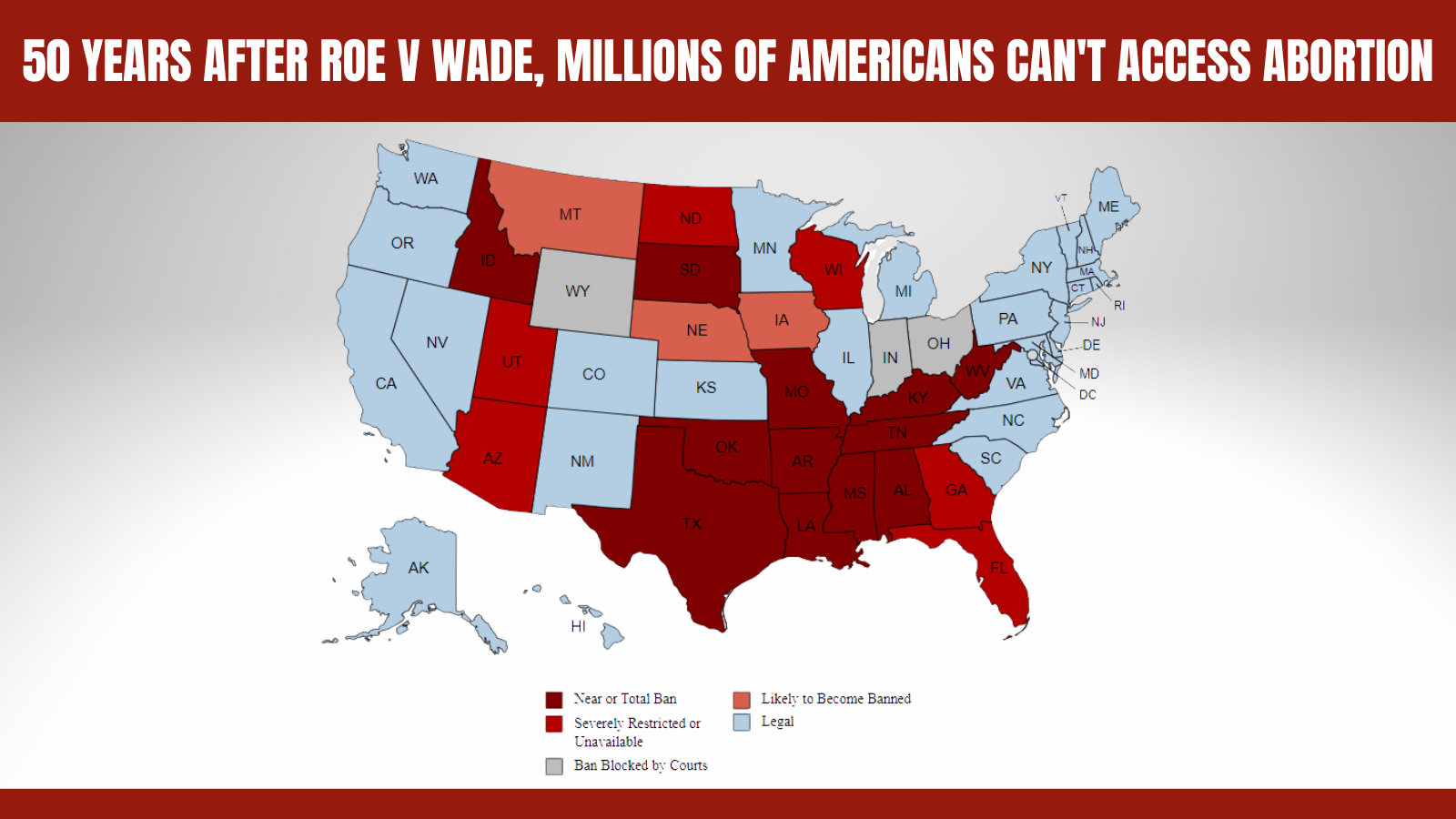It’s been nearly nine months since extremist Justices on the Supreme Court overturned Roe v. Wade. The impact of this disastrous decision has been visible across our nation’s health care system and has impacted people across the country.
Right now, people can’t access abortion in 14 states – Alabama, Arkansas, Idaho, Kentucky, Louisiana, Mississippi, Missouri, Oklahoma, South Dakota, Tennessee, Texas and West Virginia. Abortion is not being provided in North Dakota and Wisconsin pending legal challenges to existing state laws. In over a half dozen other states, there are bans on abortion that are being challenged in court. The outcomes are uncertain.
Since the Dobbs decision, 66 clinics in the 14 states where abortion is no longer accessible stopped providing abortion care and nearly one-third had closed entirely. That means that people in these states lost access to a host of services–including cancer screenings, STD testing, birth control, and other preventive care since most clinics provide a range of health care services, not just abortion. Reducing clinics in these states–many of them with large rural areas–is likely to impact overall health outcomes, not just rates of abortion.

In states like Florida, Wyoming, and Texas where state politicians continue to refuse to expand Medicaid under the Affordable Care Act, closing clinics and curtailing abortion access is especially harmful since hundreds of thousands of people don’t have affordable health care coverage either for preventive services like birth control or for routine medical care that would ensure they are healthy enough for pregnancy. Moreover, even in states which have Medicaid expansion, millions may face loss of that coverage because of the unwinding of Medicaid coverage tied to the end of the Public Health Emergency, which is expected to result in 8-15 million people losing Medicaid coverage including many parents and women of child-bearing age.
Cuts to health care coverage combined with attacks on abortion rights by extremists seeking to completely eradicate abortion and even birth control access hurts millions of people, not just those seeking to terminate a pregnancy. The crusade against abortion rights and LGBTQ people culminated last week when a Texas judge ruled against no cost preventive care in the ACA, which includes HIV prevention and birth control, among many other common preventive medical procedures like flu shots, annual wellness exams and cancer screenings. The plaintiff in the case filed the suit based on religious objections to coverage of PrEP, an HIV prevention drug, under the healthcare law. Based on one individual’s religious views, well over 100 million people could lose access to no cost preventive services if higher courts uphold the decision. The judge in the case, Judge Reed O’Connor, is the same Bush-appointed judge who ruled the ACA unconstitutional four years ago and was repudiated when the Supreme Court upheld the law.
Meanwhile, another lawsuit that targets a different medicine will be decided by another Texas judge any day. The plaintiff is a conservative Christian legal group trying to upend the use of FDA-approved Mifepristone, one of two drugs used in tandem for medication abortion. Half of all abortions in the United States are conducted via medication, which is prescribed by a physician but used by patients to safely manage their early term abortions in the privacy of their own homes. A decision in favor of the plaintiffs could severely restrict access to abortion even in states where the procedure remains legal.
Attacks on health care access through litigation are nothing new. These cases demonstrate the tremendous influence that judges have in making fundamental decisions about who gets access to health care and who does not. State lawmakers and Members of Congress can mitigate the harm and ultimately prevent further attacks by taking legislative action to protect and expand coverage of abortion and other healthcare services. In 11 states, for instance, legislatures have increased funding or improved access to services and in 14 states, lawmakers have passed “shield laws” that protect providers and patients from being charged with criminal action for seeking or providing abortion.
More action is needed in more places.

